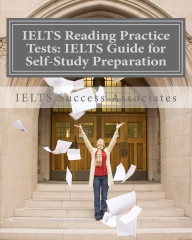IELTS Reading Page with Tips
This page provides a free practice test for IELTS reading with tips at the bottom of the page.
You can use this sample for both the Academic and the General Training tests.
Free IELTS Reading Passage
Instructions: Read the IELTS reading text below and then answer the questions that follow. When you have finished, check the answers below the last question.
A) Nowadays the word ‘tourist’ is taking on negative connotations. Travellers have recently called themselves adventurers, volunteers or fieldworkers. Nevertheless, it seems that the word ‘tourist’ will never completely disappear. People will still want to go abroad for their own enjoyment, but this type of travel will be frowned upon, and no one will really want to reveal that they are one of those people.
B) Countries such as Bali and Burma prevent tourists from visiting some parts of their countries, and the list of places one cannot visit is ever-expanding. China, Botswana, Belize, Peru, Zanzibar, East Africa and Thailand have been identified as having been negatively impacted upon by tourism. Indeed, some organisations view tourists as a threat to the environment and local cultures. They claim that tourism must be stopped, in spite of the obvious monetary benefits to the local economy.
C) This trend may appear incongruous to our modern way of life since tourism was encouraged as a good thing less than fifty years ago. In the mid-twentieth century, the advent of package holidays meant that the majority of the population could enjoy holidays abroad. In 1967, the United Nation endorsed tourism, and by 1980, tourism was the fastest-growing trade or industry in the world. At the close of the twentieth century, more than twenty-five million families went on holiday abroad each year.
D) The World Tourism Organisation (WTO) forecasts that by 2050 more than 2 billion people will be travelling at any one time. Therefore, there is an immense challenge in trying to stop people going where they want to go. In fact, this task might just be impossible.
IELTS Reading – Questions 1 to 6
Choose the correct letter A, B, C or D.
(1) What is the best title for this passage?
A. Tourism and the Environment
B. Adventurers, Tourists and Travellers
C. The Changing Face of Tourism
D. Tourism: Its Advantages and Disadvantages
Now complete the questions in the timeline below.
1967 – United Nations (2) __________ tourism.
Mid-twentieth century – Most people could finally (3) __________ package holidays.
1980 – Tourism industry experiences increasing (4) __________
End of 20th century – There were in (5) __________ of 25 million families travelling each year.
2050 – The WTO’s (6) __________ states that there will be 2 billion tourists at any time.
IELTS Reading – Answers and Explanations
(1) C – The first paragraph describes how the use of the word ‘tourist’ has changed. The remainder of the passage describes the changes to tourism itself. The main theme of historical change is especially clear in paragraph 3 because dates are provided.
(2) supported – Paragraph 3 states: “In 1967, the United Nation endorsed tourism.” So, we need a synonym for ‘endorsed.’
(3) afford – Paragraph 3 states: “In the mid-twentieth century, the advent of package holidays meant that the majority of the population could enjoy holidays abroad.” If people could enjoy going abroad, then they could afford the price of the ticket to go abroad.
(4) profits / profitability / growth – Paragraph 3 states: “by 1980, tourism was the fastest-growing trade or industry in the world.” If the business is growing fast, then its profits are increasing.
(5) excess – Paragraph 3 states: “At the close of the twentieth century, more than twenty-five million families went on holiday abroad each year.” We need the word ‘excess’ here to complete the phrase ‘in excess of.’
(6) prediction / forecast / estimate – Paragraph 4 states: “The World Tourism Organisation (WTO) forecasts that by 2050 more than 2 billion people will be travelling at any one time.” The verb in the original sentence is a verb (‘forecasts’) but our gap requires a noun.
IELTS Reading – How to Get Ready
Improve your reading skills for the exam with our study guide:
Also visit our practice tests for:
IELTS Reading Tips
IELTS Reading Tips: (1) Pace Yourself
There are three reading passages on the IELTS reading section.
Each text will be 700 to 800 words in length on the reading test.
The reading test has 40 total questions.
The time limit for the reading test is 60 minutes.
IELTS Reading Tips: (2) Understand different question types
Following each passage, you will see multiple choice questions.
You will also see tasks that are represented in a table or chart format.
IELTS Reading Tips (3) Read different types of texts every day
There are different types of the texts on the reading test, such as:
- newspapers
- advertisements
- magazines
- academic textbooks
A controversial subject will be discussed in at least one of the reading passages.
IELTS Reading Tips (4) Guess if you aren’t sure
Guess an answer if you aren’t sure which one is correct.
Also, be sure to write your answers on the answer sheet during the 60 minute time limit.
Extra time is not granted to do this.
IELTS Reading Tips (5) Get ready
Please look at the section above for an IELTS reading passage with questions and answers.
We hope you have found this IELTS reading page useful.
Please have a look at our other IELTS materials.

